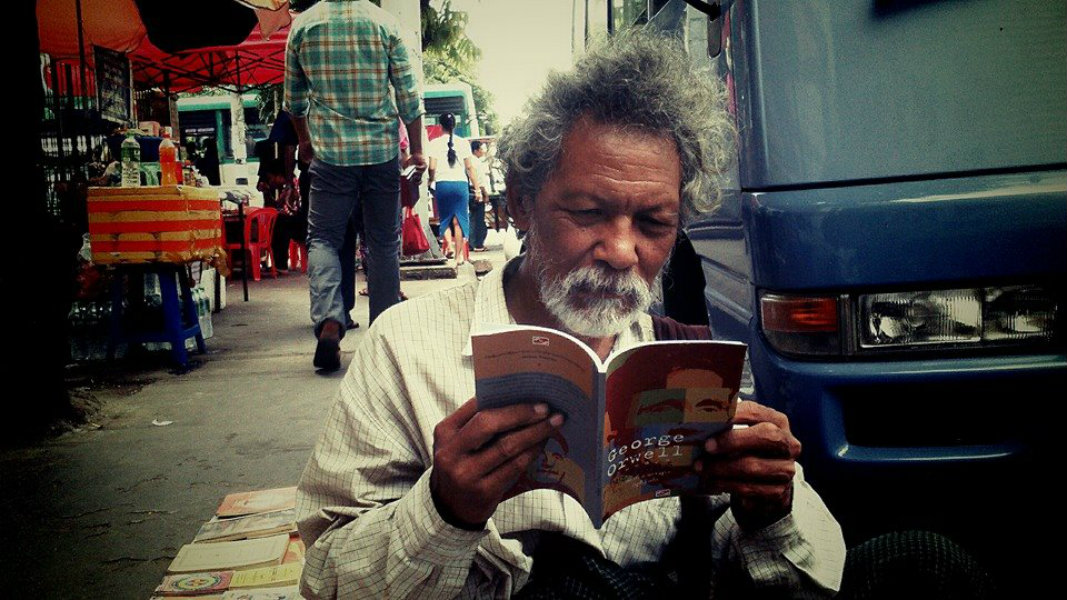A bookseller on Pansodan Road in Yangon reads what many believe to be the first Burmese translation of Orwell’s essays in circulation. FACEBOOK/THUREIN WIN
In Moulmein, in lower Burma, Thurein Win started thinking about George Orwell.
This was about two years ago, when the 38-year-old translator and acrylic portraitist traveled to the coastal town as a fixer with a New York Times correspondent.
Moulmein, now known as Mawlamyine, is the setting for one of Orwell’s most famous essays of all and arguably his most famous essay about Burma, Shooting an Elephant.
Though the assignment had nothing to do with Orwell – who served as a policeman in the British colony for five years during the 1920s – he quickly became a topic of discussion given the surroundings.
“I went there for a story and then we walked around the town. Maybe in some places, George Orwell could have walked there,” he said in an interview on Sunday in Yangon. “And then we were talking about the essays of George Orwell.”
Afterwards, “I got an idea.”
The idea was to translate Orwell’s essays into Burmese. Perspective Publishing, a local company, released the result one month ago in Yangon. Thurein says that after talking to publishing industry insiders and writers, he determined that his book marks the first time that Orwell’s essays, as opposed to his novels, are widely available in Burmese.
“First I choose the essays that are closely connected with Burma,” he said, explaining why Shooting an Elephant and A Hanging were included in the collection, which features both an English and Burmese version to make comparisons easier. The other pieces are The Sporting Spirit, Bookshop Memories and A Nice Cup of Tea.
Thurein says he plans follow up editions, “because there are a lot of good essays by George Orwell,” and after he’s done he’ll turn his attention to the book Down and Out in Paris and London in which Orwell plays stunt journalist and lives hand to mouth working in the lower rungs of the service industry.
“I think here most of my friends, writers, poets, they find it difficult living here, just like they are down and out writers. So in George Orwell’s time, Down and Out in Paris and London is most similar to the writers here,” Thurein said.
He started translating about 10 months ago. Approaching the task, he decided to use the standard, written format of Burmese – instead of a more conversational dialect – to capture Orwell’s at times formal language.
“What I like about the writing is that he is one of the best observers of the human condition. You can see his ability to go to the heart of the subject when you read an essay like Shooting an Elephant,” he said.
Thurein first encountered Orwell in the late 1990s as part of a course. The book was Burmese Days, Orwell’s first novel. At that point, he didn’t know much about the non-fiction in the writer’s oeuvre.
“Many years after Burmese Days, I found out he also wrote great essays,” he said in a Facebook message following the interview. “Not many people here know his essays are awesome.”
With the tenacity of someone who discovers new works by a favorite author, he found pdf versions of a number of pieces and devoured them. When it came time for translation, however, he deferred to a collection published by Penguin.
Various editions of Burmese Days, Animal Farm and Nineteen Eighty-Four have been in circulation for decades, whether openly or in secret to avoid censors.
But the same scrutiny isn’t applied today. Far from being persona non grata, Orwell’s work is available in almost every bookstore and stall. A new translation of 1984 was released in 2012, and a translation of Burmese Days released the same year won a government-backed award.
According to Thurein, the collection has been well received by readers. One person who has read both the original and the translation commented that when he dug into the Burmese text, he felt “like George Orwell has written in Burmese,” Thurein said. “So for me that’s an excellent comment.”
So far, he has only printed 500 copies and they are selling for the “very cheap” price of 1,500 kyat ($1.50).
“Here, publication of a book like that doesn’t make money. I don’t intend to make money,” he said.
The book was not without a little controversy. Parts of Orwell’s generalizations about local life were deemed off-putting or offensive. But Thurein said he couldn’t show the entirety of Orwell if he cut out any passages.
“Some of the editors told me to omit these words, but I don’t do it.”
Orwell’s essays in Burmese are available at Inwa Bookstore on Pansodan Road



